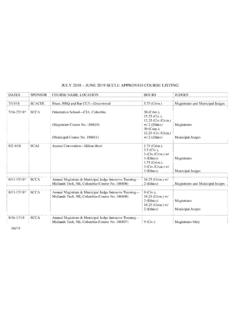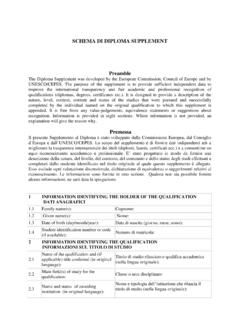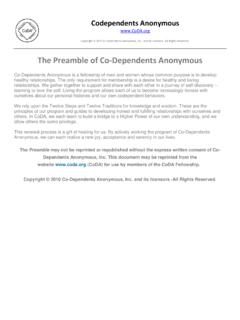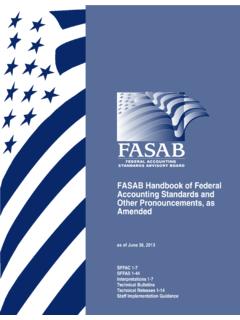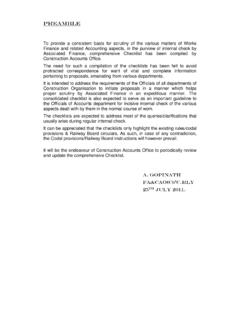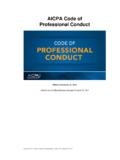Transcription of RULE 408 CONTINUING LEGAL EDUCATION AND …
1 1 RULE 408 CONTINUING LEGAL EDUCATION AND specialization preamble In the modern LEGAL environment, the law continues to grow more complex and it changes with increasing frequency. CONTINUING EDUCATION is no longer a luxury, but is a necessity for all lawyers. Mindful of the improvements in the administration of justice that have resulted from our judicial CONTINUING LEGAL EDUCATION and mandatory CONTINUING LEGAL EDUCATION requirements, we believe that all judges and lawyers must meet certain minimum CONTINUING LEGAL EDUCATION requirements if they are to maintain their competency. We have provided for the CONTINUING LEGAL EDUCATION of elected and selected other judges in Rule 504. It is our intention that all members of the Bar and those judges (other than federal judges) who are not required to satisfy the requirements of Rule 504 shall fulfill the mandatory CONTINUING LEGAL EDUCATION requirements specified in this Rule.
2 (a) CONTINUING LEGAL EDUCATION Requirements. (1) Annual Report of Compliance; Fees; Waiver and Suspension. The reporting year under this rule shall run from March 1 through the last day in February. Reports of compliance for the reporting year shall be due not later than March 1, and shall be submitted to the Commission on CONTINUING LEGAL EDUCATION and specialization (Commission) on a form prepared by the Commission along with a filing fee specified in the regulations of the Commission. The Commission may specify a penalty that must be paid if a person fails to timely file a report establishing compliance and/or pay the annual filing fee. For good cause shown, the Commission may, in individual cases involving extraordinary hardship or extenuating circumstances, waive or modify the requirements of this rule.
3 When appropriate, and as a condition for any waiver or modification, the Commission may proportionally increase CONTINUING LEGAL EDUCATION (CLE) requirements for the succeeding reporting year. A person who fails to comply with the CLE requirements of this rule will be suspended as provided by Rule 419, SCACR. (2) CONTINUING LEGAL EDUCATION Requirements for Members of the South Carolina Bar. Except as provided below, all members of the South Carolina Bar shall be required to attend at least fourteen (14) hours of approved CLE courses each reporting year. At least two (2) of the fourteen (14) hours required annually shall be devoted to LEGAL ethics/professional responsibility (LEPR).
4 At least once every three (3) reporting years, the member must complete one (1) hour of LEPR devoted exclusively to instruction in substance abuse, mental health issues or stress management and the LEGAL profession. The following members of the South Carolina Bar shall be exempt from these requirements: (A) specialists certified pursuant to this Rule who satisfy the CLE requirements of their specialty; provided, however, that at least two (2) hours of the CLE credits completed by certified specialists shall be devoted to LEPR. At least once every three (3) reporting years, the member must complete one (1) hour of LEPR devoted 2exclusively to instruction in substance abuse, mental health issues or stress management and the LEGAL profession.
5 (B) members who are at least sixty (60) years old and have been admitted to practice law for thirty (30) or more years, and who apply to the Commission for this exemption. Further, any exemptions granted prior to June 23, 1994, shall remain in effect. Provided, however, that if a member who receives an exemption or is entitled to an exemption under this provision is suspended for a definite period of more than six (6) months under Rule 413, SCACR, this exemption shall not apply or be granted during the suspension period; (C) inactive members, military members, and retired members. (D) judicial members who are subject to the CLE requirements of Rule 504, SCACR. (E) members who are federal judges or federal administrative law judges.
6 (F) limited members licensed under Rule 415, SCACR (Limited Certificate of Admission for Retired and Inactive Attorney Pro Bono Participation Program). (3) CONTINUING LEGAL EDUCATION Requirements for Foreign LEGAL Consultants. As required by Rule 424, SCACR, all foreign LEGAL consultants shall attend at least two (2) hours of approved CLE courses devoted to LEPR each reporting year. (b) Commission on CONTINUING LEGAL EDUCATION and specialization . (1) Membership and Terms of Office. The Commission on CONTINUING LEGAL EDUCATION and specialization shall consist of twelve (12) members. The Supreme Court shall appoint to the Commission: one (1) member of the Supreme Court or Court of Appeals; one (1) circuit court judge; one (1) family court judge; two (2) attorneys from each of the four (4) judicial regions established by order of the Chief Justice dated January 9, 1992; and one (1) additional attorney from Region II.
7 Of the members first appointed to the Commission, four (4) shall serve a term of one (1) year; four (4) shall serve a term of two (2) years; and four (4) shall serve a term of three (3) years. Members thereafter appointed shall be appointed for three (3) years, but shall continue to serve until their successors are appointed. A member appointed to fill an unexpired term shall serve only to the completion of that term and until his or her successor is appointed. Except for the initial appointments to the Commission, the House of Delegates of the South Carolina Bar shall nominate up to two (2) members of the South Carolina Bar to fill each attorney position on the Commission. No person shall be appointed for more than two (2) consecutive terms.
8 The Supreme Court shall appoint a chairperson and a secretary of the Commission from among the Commission's membership. (2) Duties. Subject to the CONTINUING jurisdiction of the Supreme Court, the Commission shall have general jurisdiction over all matters pertaining to mandatory CONTINUING LEGAL EDUCATION and specialization in the practice of law and shall: 3(A) administer the programs established pursuant to this Rule and Rule 504, SCACR; (B) select fields of specialization in which South Carolina lawyers may be certified; (C) appoint and supervise specialization Advisory Boards, each consisting of at least five (5) lawyers practicing in the specialty field. Each specialization Advisory Board shall be charged with the responsibility for establishing standards and procedures for certification, recertification and decertification of lawyers in specialty fields approved by the Commission; (D) subject to the approval of the Supreme Court, make and publish rules, regulations, bylaws, standards and procedures implementing its duties.
9 No proposed rule, regulation, by-law, set of standards or procedures, or any substantive amendment to the preceding shall be adopted by the Commission or any specialization Advisory Board unless it is first published in the South Carolina Bar News or its successor publication for the information and comments of members of the Bar at least ninety (90) days prior to the proposed effective date. A public hearing shall be ordered by the Commission or specialization Authorization Board upon receipt, at least ten (10) days prior to the effective date, of a petition for a hearing signed by at least ten (10) members of the Bar. Notice of the hearing shall be given in the South Carolina Bar News or its successor publication.
10 An adopted rule, regulation, by-law, set of standards or procedures, or any substantive amendment to the preceding shall not become effective until it is filed with and approved by the Supreme Court. The final versions shall be included in any publication of the South Carolina Appellate Court Rules. The procedures contained in this paragraph shall not apply to internal operating procedures of the Commission; (E) direct a staff headed by an Executive Director appointed by the Supreme Court. The staff shall assist the Commission and the specialization Advisory Boards in administering this Rule, including processing applications for certified specialist status and for recertification, processing decertification orders, advising specialization Advisory Boards on CLE course accreditation, providing information about the requirements of this Rule, assisting the Commission and specialization Advisory Boards in preparing reports, and performing other administrative assignments as directed by the Commission; and (F) report, at least annually, to the Supreme Court and the South Carolina Bar.

